

The Koch brothers entered California’s political fray September 14, a Friday, with a $4 million donation to a new pro-Proposition 32 political entity called California Future Fund. By Tuesday, September 18, the fund had released its first TV spot, titled “Telephoto.” What does $4 million in Koch cash buy? Let’s take a look at this half-minute spot, shot by shot.
00 min. 01 sec. – If we had millions of dollars of Koch brother money, maybe we could afford a telephoto lens too.
00:06 – Clearly not shot with a telephoto lens. Thematically, the scene should have been shot through the open window. Instead, our supposedly heroic cameraperson with a telephoto lens of moral clarity is physically inside the room with the shady suits. They look quite comfortable with his presence. A perfect metaphor for Prop. 32.
00:10 – “Big corporations and government unions control politicians,” our ominously-voiced narrator tells us.
» Read more about: Framed: Proposition 32's Deceptive TV Ad »
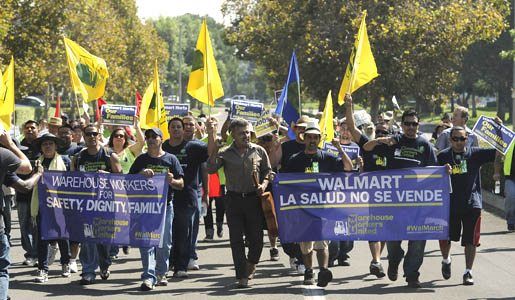
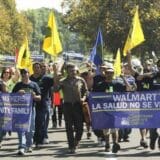
By the last mile through the grid in Downtown Los Angeles, the long, hot stretches of dusty San Bernardino County were a distant memory for 50 warehouse workers and supporters who marched 50 miles in six days from the Inland Empire to the city center.
Walking through the summer heat, warehouse workers who move Walmart merchandise took their protest for better working conditions out of the shadows in Riverside and San Bernardino counties and into LA. On the final day of the WalMarch, weary marchers, who slept on church floors and dined on the good graces of supporters, were met by hundreds of supporters on the steps of LA City Hall.
“We became a family along the way,” said David Fancote.
After several appeals to Walmart and its contractors to end retaliation and fix poor working conditions at one warehouse dedicated to moving Walmart goods in Mira Loma,
» Read more about: WalMarch Ends, But Warehouse Strike Continues »


We all learn many important lessons from our parents. One lesson that I learned from my father was this: If you cut through a pipeline that’s carrying raw sewage you should be really, really sure that it’s not under pressure before you start. Unfortunately, this was something I discovered through actual observation when my father tried to fix our septic system and was sprayed down with a putrid stream of human waste as a reward for his efforts.
This is the type of home repair that I, now an Angeleno, never need to make on my own. Because I am currently a fancy city-dweller, I no longer have to take my trash to the dump, fix potholes in the road or do all of the other chores that are part of everyday country life but are magically taken care of when one lives in the city.
Not only do I get to avoid these day-to-day chores,

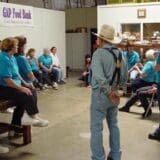
The U.S. Census Bureau released the American Community Survey yesterday, and the broad study of poverty, inequality and youth mobility failed to present strong evidence that the recession has fully subsided. Instead, the study tells a familiar tale of winners and losers in the wake of the recession.
According to the report, poverty increased between 2010 and 2011. NPR reports on the findings:
The number of Americans living in poverty grew to 15.9 percent in 2011. It was 15.3 in 2010. That means that 48.5 million Americans had an income below the poverty level.
Poverty increased by greater margins in the three years prior, but the uptick, however slight, casts real doubt on an economic turnaround. Notably, an additional 2.3 million would have fallen into poverty without 2011′s extended unemployment benefits, and the poverty rolls could expand as jobless benefits expire.
In addition,
» Read more about: Recession Still Very Real for Americans »


Many of you have been following LAANE and its partners’ effort to protect Chinatown from Walmart, which is pursuing a strategy to get into urban areas across the country including Boston, New York, Washington, DC and Chicago. Over the last six months, thousands of people in L.A. have marched against Walmart, community groups have appealed their building permits and a moratorium on large chain stores in Chinatown is pending. Across the nation, Walmart workers have organized creative actions against Bentonville shareholders and community groups have launched rallies and even flash mobs to hold the retailer accountable.
Yet many here in L.A. fear it is not enough to stop Walmart. After all, Walmart was able to get its building permits issued by a department known for moving slower than a glacier less than 24 hours before a looming moratorium. And why did they need those expedited permits—was it really that urgent to begin construction on a Walmart store in a space that had been vacant for 20 years?
» Read more about: Brooklyn Tells Walmart to “Talk to the Hand” »


In 15 days, food stamp benefits will be cut by some 20 percent, thanks to Republicans in Congress who tossed this mean-spirited gem into one of GOP’s hostage bills that President Obama was forced to sign because a veto would result in the government shutting down, or the US reneging on its bills, or something equally destructive.
On October 1, millions will see their benefits stripped away or cut greatly.
Most unemployed people will get cut off. Many working poor, who rely on food stamps to make ends meet, will go hungry. So, too, will countless military families – a separate disgrace in and of itself. Far too many homeless families and individuals will find their chair at the dinner table yanked away just as they are sitting down to eat, a sight gag that hasn’t been funny since it was pulled on Fatty Arbuckle in some of his movies back in the Twenties.
» Read more about: Food Stamp Cuts on the Line in Congress »


Political money is a featured dish on the spending menu of Tampa-based Outback Steakhouse restaurants. The chain was controlled by Bain Capital until last month, when its parent, Bloomin’ Brands, went public in an Initial Public Offering. Bain and its investors stand to earn an estimated 88 percent return on their investment in the company.
Almost everyone now knows Bain’s critical role in building Mitt Romney’s wealth as a leading light of the 1 percent. And, Ann and Mitt Romney are investors in the particular Bain fund that bought and then sold Bloomin’ Brands.
But few noticed that Outback’s Political Action Committee (OSI PAC, also known as OSI Restaurant Partners) this year emerged as the restaurant industry’s biggest political donor. So far in 2012, OSI PAC has given more money to political candidates than the PACs of any of these bigger and better known firms: Coca-Cola, McDonald’s, Pepsi, Taco Bell,
» Read more about: Low-Wage Sizzle: Outback Steakhouse PAC »


Why does California reward ultra-rich companies that move jobs out of the state?
We’ll tell you why. In 2009, during secret, behind-closed-doors budget negotiations, a handful of state legislators and Gov. Schwarzenegger snuck in a colossal but little-known corporate tax giveaway into the budget in the dead of night. This loophole, known as the “elective single sales factor,” gives corporations the option to reduce the taxes they pay to California by keeping jobs and investment in other states – giving companies a huge incentive to hire outside of California. The loophole has already cost the state tens of thousands of jobs, and the only ones who are benefitting from it are California’s richest corporations. In fact, 80 percent of the benefits from this loophole go to the 0.1 percent of California corporations with gross incomes over $1 billion.
It’s high time we end the practice of shelling out taxpayer money to ultra-profitable companies that kill California jobs.
» Read more about: Proposition 39: Bringing Jobs Back to California »
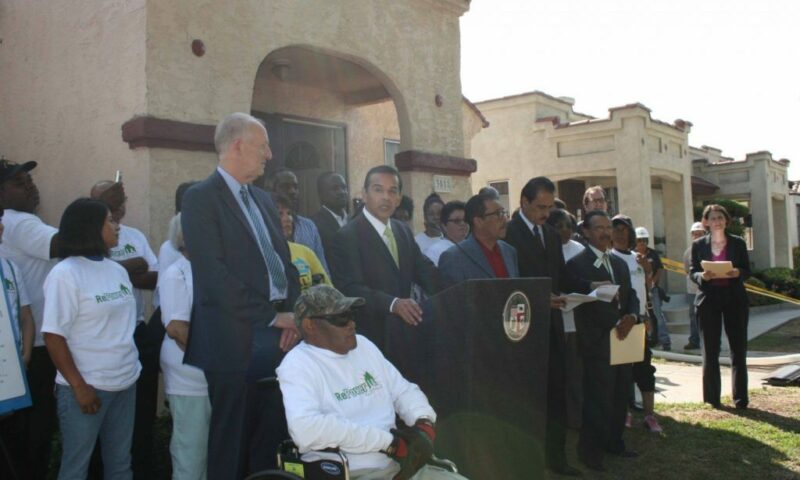
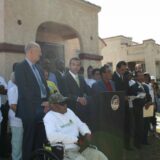
Los Angeles, long fighting its reputation as one of the least green cities in the country, is making real changes to improve its standing.
City leaders and members of RePower LA gathered Monday, September 17, to recognize the City’s major strides in energy efficiency. The event took place at a South L.A. home while workers demonstrated an energy efficiency upgrade on the residence. It was part of a Department of Water and Power (LADWP) program championed by the RePower LA coalition. Mayor Antonio Villaraigosa, City Council President Herb Wesson, Councilmember Richard Alarcon, DWP General Manager Ron Nichols, business leaders and residents each spoke about the importance of energy efficiency and job creation, particularly in the current economy.
“We’re proud to announce a renewed commitment to energy efficiency from the Department of Water and Power,” said Mayor Villaraigosa. “DWP has proposed to more than double its energy efficiency budget.


How different would California look with Proposition 32’s passage? To imagine, it’s not necessary to focus on a Golden State without the legacy of its unions, but rather to think of a California in which only the rich and powerful have a say in Sacramento and in the polling booth.
“It will have a devastating effect,” says John Logan, director of Labor Studies at San Francisco State University, of Prop. 32’s impact. “California would be transformed as a state.”
On environmental issues alone, Prop. 32 stands to roll back decades of progress in making California a global leader in green policy-making.
“You don’t have to go very far back to find likely examples of how it would change California,” Logan says, adding that Prop. 32 would remove labor’s voice from nearly all political conversations.
That voice is not always confined to lobbying efforts in the state legislature.
» Read more about: If Proposition 32 Passes: A Not-So-Green Golden State »


On Monday, September 17, RePower LA will be joined by Los Angeles Mayor Antonio Villaraigosa, City Council members, Los Angeles Department of Water and Power general manager Ron Nichols, and others at the site of a South L.A. home undergoing an energy efficiency upgrade.
City leaders are now touting the programs, initially proposed by the RePower LA coalition, which are upgrading small business facilities and the homes of those struggling in the current economy. The customers reduce their energy use and save money, L.A. reduces its reliance on dirty coal-fired power plants, and members of our hardest-hit communities are able to access good career path jobs through the Utility Pre-Craft Trainee program of the International Brotherhood of Electrical Workers, Local 18.
With such win-win-win potential, it is good to see LADWP and city leaders embracing energy efficiency as a central pillar of L.A.’s future.
Writing in a Daily News op-ed,
» Read more about: City Leaders Tout RePower LA's Energy Efficiency Programs »


“Hi. I’m a volunteer with the We Buy Local campaign here in Long Beach.”
So begins the conversation with undecided voters about the Long Beach living wage measure on the November ballot.
Most Long Beach hotel workers live, work and shop in the city. And if the hotel living wage passes, they’ll have more money to put into the Long Beach economy.
More than 100 volunteers and supporters gathered last Saturday to pick up information packets and start knocking on local doors. It was hot in the church classroom where they assembled, but the mood was electric.
More than 140 small business owners are supporting Measure N, as are local religious leaders and city council members Suja Lowenthal and Steve Neal.
College students and retired folks, LGBT activists, Cambodian youth organizers, religious leaders and politicians were all excited to be working together to change conditions for the city’s 2,000 hotel workers and to shake up the political environment in Long Beach.
» Read more about: Living Wages Would Boost Long Beach's Economy »


Today Frying Pan News launches a series of investigations into Proposition 32, a measure on the November ballot that, if passed, would drastically alter the political landscape in California. “Killing the California Dream” will shed light on Prop. 32’s backers and their motivations; analyze how major public policy decisions would be affected if Prop. 32 passes; and document how corporate money historically has run counter to the interests of most Californians, among other things. The series will run through the November 6 election.
“If Proposition 32 passes, corporate donations will flat-out dominate politics in California,” said Steven Mikulan, editor of Frying Pan News. “We’ve launched this investigative series to provide California voters with the facts about who is behind the measure and how the passage of Prop. 32 would enable corporations to determine policy on everything from health care, pensions and workplace safety to the environment, education and consumer protection. With so much at stake for California,
» Read more about: Frying Pan News Launches Series on Proposition 32 »
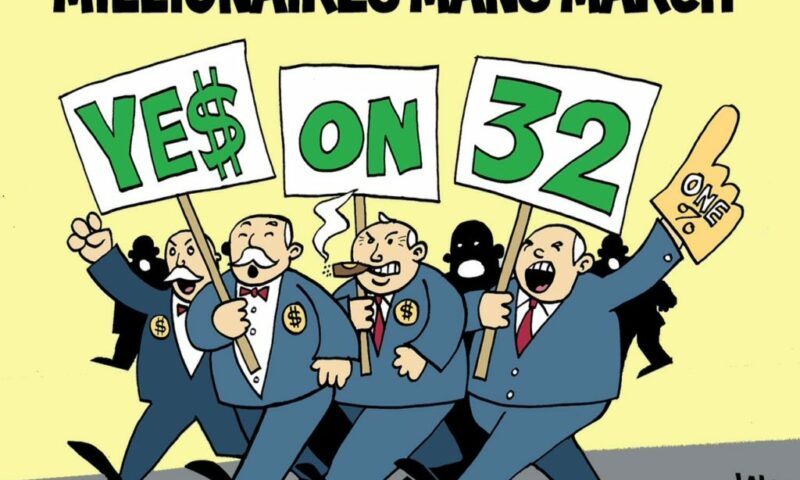
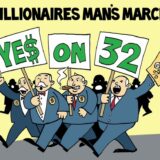
Click image to enlarge.
» Read more about: Lalo Alcaraz: Proposition 32's Grassroots Supporters »
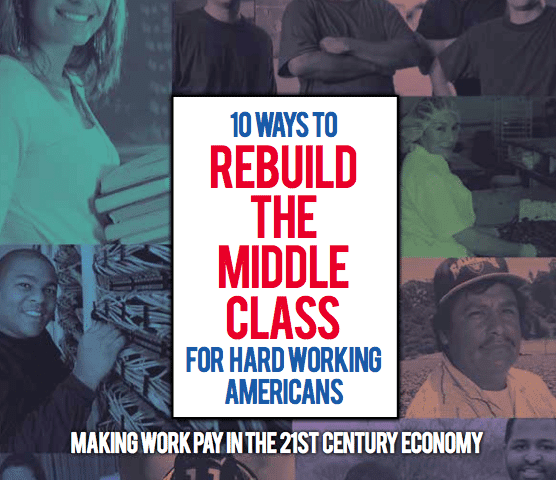
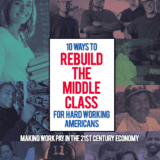
As pundits constantly remind us, when it comes to the national elections, it’s the economy, stupid.
But the parameters of the debate about our dire economic straits has been disappointingly narrow, leaving out some of the most pressing issues facing tens of millions of Americans.
If national leaders are serious about reviving the economic fortunes of our struggling middle class, the unemployed and the growing ranks of the working poor, they would do well to take a long, hard look at the new report, “10 Ways to Rebuild the Middle Class for Hard-Working Americans: Making Work Pay in the 21st Century.” Released today by a consortium of two dozen organizations across the country, the report is a clarion call for a set of policies that are largely off the radar screen of both major parties. This deafening silence notwithstanding, the prospect of a true economic recovery that restores the promise of broadly shared prosperity is nearly inconceivable without the adoption of most of these proposals.
» Read more about: A Prescription for Middle Class Recovery »
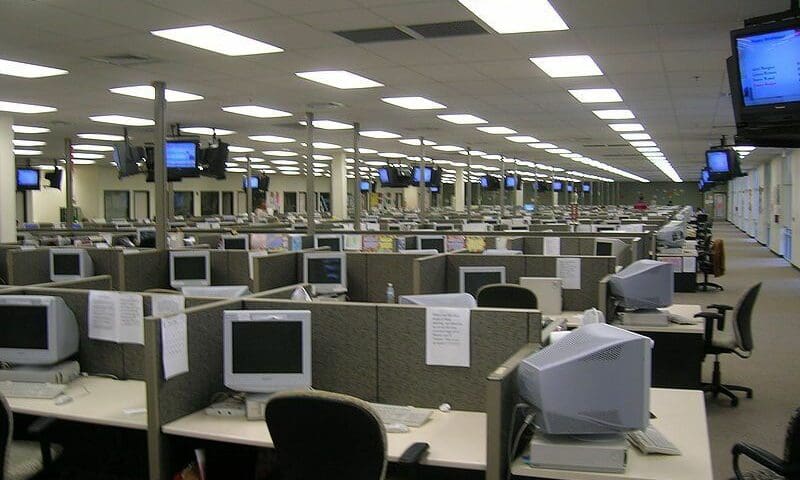

The 2012 State Legislature adjourned on August 29th and now hundreds of bills sit, awaiting the Governor’s signature. One of those bills, Assembly Bill 2508 by Assemblywoman Susan Bonilla (D – Concord), will call back hundreds of jobs into California’s economy.
Current state law allows state public benefit contracts, including call-center contracts, to be awarded to contractors that perform the work outside of California, and even the United States. AB 2508 would prohibit state agencies that manage public benefit programs from contracting for call center services outside the state.
The federal and state economies are recovering from the great recession and California still has a high unemployment rate. Meanwhile, though it has cut services available to out-of-work and low-wage earners by over $15 billion over the past four years, California still spends billions on public benefits to help these individuals and families prevent hunger and homelessness and be prepared with the necessary job skills for when the economy bounces back.


Workers at a major Walmart-contracted warehouse in Riverside County went on strike Wednesday morning. They are protesting what they say are unfair labor practices that they have faced on the job after months of working in hot temperatures this summer.
The employees—who do not have a recognized union—walked off their jobs during the first shift at an NFI warehouse in Mira Loma, calling, according to a statement, “for an end to retaliation and unfair labor practices.”
“When we spoke out to change terrible working conditions, workers were suspended, demoted and even fired. They spied on us and bullied us, all because we are fighting for dignity” said Limber Herrera, a warehouse worker for four years.
The strike comes one day before workers and their supporters begin a 50-mile, six-day pilgrimage from the warehouse to Downtown Los Angeles.
Workers face inadequate access to clean water, work under scorching heat that reaches well above 100 degrees,
» Read more about: Walmart-Contracted Warehouse Workers Go on Strike »
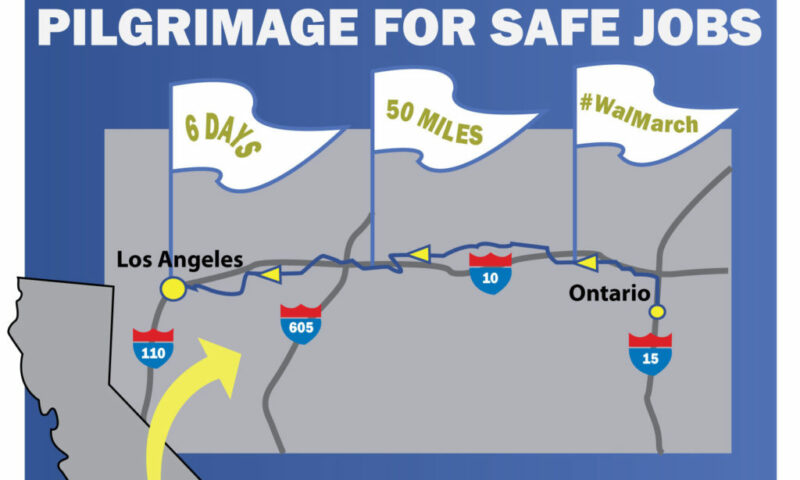

Warehouse workers will embark Thursday, September 13, on a 50-mile protest march. Warehouse Workers United says the objective is “to urge Walmart to eliminate illegal and inhumane working conditions in its contracted warehouses in Southern California.”
The pilgrimage will take workers from Riverside to Los Angeles. Along the way they’ll be sleeping on church floors and relying on community organizations for support and meals.
The marchers will be joined daily by supporters and elected officials. Here is the march’s route map. Follow it on social media using the hashtag #WalMarch.
» Read more about: WalMarch: Warehouse Workers to March for Safe Jobs »